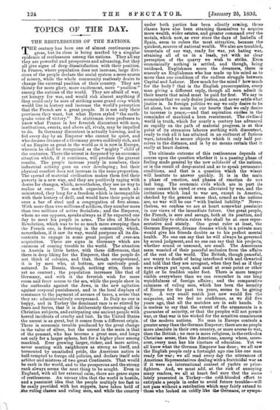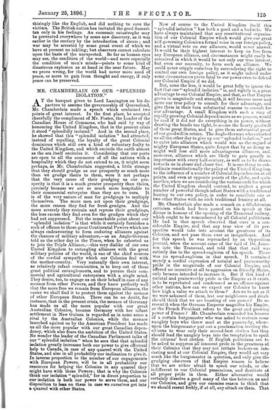TOPICS OF THE DAY.
THE RESTLESSNESS OF THE NATIONS. THE century has been one of almost continuous pro- gress, but its close is being marked by a singular epidemic of restlessness among the nations. They all say they are powerful and prosperous and advancing, but they all give signs of deep dissatisfaction with their position. In France, where population does not increase, large divi- sions of the people declare the social system a mere source of misery, while the whole community restlessly desire to change the external position of their country. They are thirsty for more glory, more excitement, more "position" among the nations of the world. They are afraid of war, vet hungry for war, and would risk almost anything if they could only be sure of striking some grand coup which would live in history and increase the world's perception that the French are a great people. It is not only their provinces they want, but what Byron styled " the earth- quake voice of victory." No statesman even professes to know what France in her feverish discontent with men, institutions, events, and above all, rivals, may be impelled to do. In Germany discontent is actually burning, and is fed every day by an Emperor who cannot be quiet, and who dreams dreams of a Germany grown suddenly rich, and of an Empire as great in the world as it is now in Europe, wherein lie shall be recognised as the " mighty " child of the centuries. There the unrest is deepened by an economic situation which, if it continues, will produce the gravest results. The peop'e increase yearly in numbers, their industrial activity goes on ever developing ; but their physical comfort does not increase in the same proportion. The spread of material civilisation makes them feel their poverty in a new way, and they are positively raging with desire for changes, which, nevertheless, they see no way to realise at once. Too much organised, too much ad- ministered, they long for a freedom which is incompatible with their history of drill, and would have their people at once a bar of steel and a congregation of free atoms. With more than two millions of soldiers, they number more than two millions of active Socialists ; and the Emperor, whom no one opposes, speaks always as if he expected one day to meet his people in arms. The idea of Heine's Revolution, which was to be so much more sweeping than the French one, is festering in the community, which, nevertheless, if it saw its way, would postpone all its dis- contents to engage in some great project of over-sea acquisition. There are signs in Germany which are ominous of coming trouble to the world. The situation in Austria is little better, with these differences, that there is deep liking for the Emperor, that the people do not think of colonies, and that, though overgoverned, it is by men who, at bottom, are carelessly good- natured. In Russia, though nothing stirs, there is yet no content ; the population increases like that of Germany, and with it the feverish wish for more room and freer access to the sea, while the people show in the outbreaks against the Jews, in the new agitation against corporal punishment, and in the local displays of resistance to the payment of arrears of taxes, a sense that they are administratively overpressed. In Italy no one is happy, and in Turkey the dominant race is so stirred by fears and furies, that it is deliberately threatening all its Christian subjects, and extirpating one ancient people with horrid incidents of cruelty and lust. In the United States the unrest is as great, but it comes from a different origin. There is economic trouble produced by the great change in the value of silver, but the unrest in the main is that of the peasant, who has become a great man, and longs not only for a larger sphere, but for a higher place among mankind. Ever growing larger, richer, and more active, never meeting with neighbours as strong as itself, and tormented by unsatisfied pride, the American nation is half-tempted to forego old policies, and declare itself sole arbiter and mistress of two great Continents. That would be rank in the world, and to the prosperous and the strong rank always seems the next thing to be sought. Even in England, with all her external calm, there are grave signs of restlessness. An uneasy idea that the world is hostile, and a pessimist idea that the people multiply too fast to be easily provided with hot suppers, have taken hold of the ruling classes and ruling men, and while the country under both parties has been silently arming, those classes have also been straining themselves to acquire more wealth, wider estates, and greater command over the metals, which now, as ever since the days of Isabella of Spain, seem to rulers the most attractive, because the quickest, sources of national wealth. We also are troubled, uncertain of our way, ready for war, yet hating war, straining all of us in a leash, yet with no clear perception of the quarry we wish to strike. Even economically nothing is settled, and though, being unideaed, Englishmen scorn the dreamers, there is scarcely an Englishman who has made up his mind as to more than one condition of the endless struggle between Capital and Labour. How much for the mind ? how much for the body ? that is the English preoccupation, every man giving a different reply, though all men admit in their hearts that mind must be paid for first. We say in economics that we only desire justice, and never settle what justice is. In foreign politics we say we only desire to be let alone, but we mean in our hearts that we only desire to increase in peace,—and that aspiration excites in the remainder of mankind a keen resentment. The civilised world in truth, which for nearly a century has advanced so rapidly on the path of material progress, is at this point of its strenuous labours seething with discontent, ready to risk all it has attained in an outburst of furious wars, intended to secure objects which it only half per- ceives in the distance, and is by no means certain that it really at heart desires.
The ultimate outcome of this restlessness depends of course upon the question whether it is a passing phase of feeling made general by the new solidarite of the nations, or is the result of deep-seated and so to speak permanent conditions, and that is a question which the wisest will hesitate to answer quickly. It is in the main a phase of emotion, and phases of emotion do not last long. The economic evils which are in part its cause cannot be cured or even alleviated by war, and the irritations which lead to war are, except in America, checked by the general sense that, armed as the nations are, no war will be one " with limited liability." Never- theless, we confess we are at heart somewhat pessimist in our views of the immediate future. One great people, the French, is sore and savage, both at its position, and its inability to obtain rulers who shall be at once repre- sentative and stately. One great ruler at least, the German Emperor, dreams dreams which in a private man would give his friends doubts as to his perfect mental health. No one can say that he will always be governed by sound judgment, and no one can say that his projects, whether sound or unsound, are small. The Americans seem wearied of their peaceful seclusion from the affairs of the rest of the world. The British, though peaceful, are weary to death of being interfered with and thwarted and told that they are arrogant, when they feel as if they were always put upon, and must at some point or other fight or be trodden under foot. There is more temper visible everywhere than we can remember in our long watchfulness of foreign affairs ; and the comparative calmness of ruling men, which has been the security of Europe for the past ten years, seems to be giving way. A very small match just now would fire the magazine, and we feel no confidence, as we did five years ago, that all the matches are in safe hands. It is useless to say that the extent of the armaments is a. guarantee of security, or that the peoples will not permit war, or that war is too wicked for the sensitive consciences of the modern nations. No man in Europe controls a greater army than the German Emperor; there are no people more absolute in their own country, or more averse to war, than the British ; no race is more religious, in the orthodox Christian sense, than the American, among whom, more- over, every man has his tincture of education. Yet we all know what the German Emperor has done ; we all saw the English people only a fortnight ago rise like one man ready for war ; we all read every day the utterances of American Representatives dealing with a fratricidal war as if it were an international contest of yachts or prize- fighters. And, we must add, at the risk of annoying many readers, we all at heart feel sure that the scene lately presented in Turkey—the cold-blooded effort to extirpate a people in order to avoid future trouble—will not pass without a retribution which may fairly extend to those who looked on coldly like Um, Germans, or sympa- thisingly like the English, and did nothing to save the victims. The British nation has imitated the good Samari- tan only in his feelings. An economic catastrophe may be prevented everywhere by some new discovery, as it was earlier in the century by the introduction of steam ; and war may be arrested by some great event of which we have at present no inkling; but observers cannot calculate upon the basis of the unexpected. So far as human eyes may see, the condition of the world—and more especially the condition of men's minds—points to some kind of disastrous explosion as at hand in the near future. May we prove wrong, for the world had never more need of peace, or more to gain from thought and energy, if only peace can be preserved.



















































 Previous page
Previous page